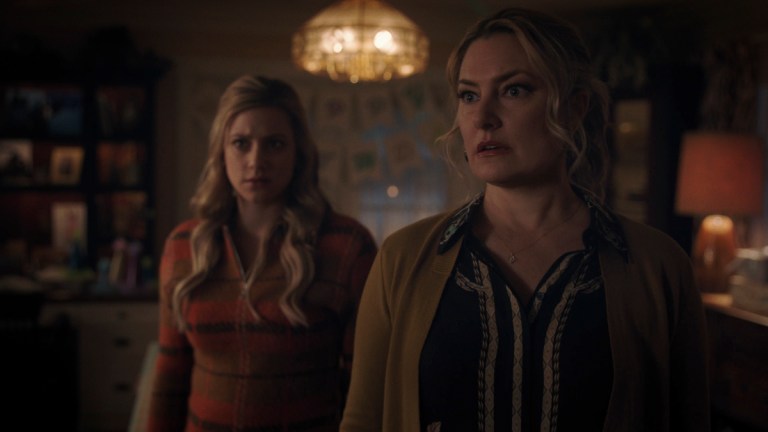Riverdale Gives Clarity on Betty’s Future Path
Riverdale's stunning midseason finale has Betty figuring out how to make her darkness her greatest asset.

In Riverdale’s stunning midseason finale, the question of whether Betty will ever give in to her dark impulses is answered.
This Riverdale review contains spoilers.
Since making her comic book debut in late 1941, Betty Cooper has become an archetype (and Archie’s type, well, one of them) for the so-called all American girl next door. Beautiful and blonde were her original personality traits. However, the comics were much smarter than to just let Betty become a tired ditzy stereotype. Through the writing of Archie legends like Frank Doyle, George Gladir and Kathleen Webb, Betty Cooper was transformed into a character to be reckoned with.
Across the decades, Betty had been established as everything from Riverdale’s best mechanic to endlessly loyal and forgiving – making her a perfect foil to the oft-snobbish Veronica in the process. Just as Betty’s obsession with Archie was reaching levels of absurdity in the 1970s, the publisher decided to go meta. The result was the soap operatic “Betty Cooper, Betty Cooper” storyline in the Betty and Me comic, which itself was riffing on the comedic nervous breakdown that was the TV series Mary Hartman, Mary Hartman.
So when Riverdale debuted in 2017, it was little surprise to fans of the Archieverse that Betty Cooper was the most complex character on the series. Seeing how underwritten a good deal of the show’s characters are (Archie, Kevin, Reggie, etc), it’s something of a relief that the same fate didn’t befall Betty. This is most likely because of the talent of the actress portraying her, Lili Reinhart. The way Reinhart portrays Betty is stunning to watch – vulnerability, dread and innocence swirling behind her eyes. You believe in every ridiculous plotline that Betty is immersed in because of Reinhart’s seemingly effortless ability to make the implausible feel ordinary. It’s a wonderful bit of acting sleight of hand that she pulls off every week, and no wonder that the show’s writing staff continually gives her more bizarre and/or heartbreaking material to work with. They know that Reinhart can pull it off, so they keep putting Betty through the dramatic ringer.
The biggest ongoing mystery about Betty is whether or not she will give in to the serial killer gene she possesses and let her darkness take over. No matter how often the show reminds you that Betty once put her beloved cat out of its misery by bashing its head in with a rock after it was hit by a car, or that her dad and brother are cold-hearted killers, one gets the sense that she will never fully become Dark Betty.
This was basically confirmed by tonight’s mid-season finale, which cemented another possibility beyond Betty will lose control and become a serial killer or she will overcome any murderous impulses – namely that she will utilize her darkness to bring evildoers to justice.
Friends, the era of Antihero Betty is upon us.
Despite the promise of fun narrative developments to come in this installment that range from the Mighty Archie Art Players doing their take on A Few Good Men to the aftermath of Jughead’s maple-mushroom trip/possible Mothman abduction, it was Betty’s story that was the most captivating here. All season Betty has been coping with her failure as an FBI recruit to bring the Trash Bag Killer (who is based on a real murderer) to justice. Her PTSD from this incident and the yet-to-be-revealed suffering at TBK’s hands are driving her to not let her guard down ever again. Yet her best intentions are immediately discarded though when she is unable to rescue Polly on the Lonely Highway.
Betty has been spiraling since Polly’s disappearance, feeling hopeless that she was unable to save her sister. Just as she has been unable to save her father’s soul. Or arrest the Trash Bag Killer. The darkness that Betty feels is tangible, and a lesser character would have been consumed by it long ago. One of the supposedly bright spots in her life is her FBI superior Glen Scot (Greyston Holt). I’m pretty sure that fellow agents aren’t supposed to be romantically linked, but seeing what show we are discussing here that is the most minor of nits to pick. This episode reveals that Glen is exploiting Betty’s familial trauma as the basis for a dissertation on nature vs. nurture in a family where killing has become commonplace. As if that wasn’t reprehensible enough, he basically blackmails Betty into compliance, subtly threatening that her future at the FBI is on the line if she doesn’t cooperate.
When Charles and Chic crash the birthday party being held for Juniper and Dagwood (who are chillingly revealed to be budding sociopaths in their own right in this episode), Betty’s trauma and training combine. As a result, we learn about who Betty truly is – a badass who is on the side of justice but doesn’t have a problem bending the very limits of the law to protect those she loves. Following a makeshift wedding between the pair of convicts, Riverdale launches into what is arguably the most unsettling sequence it has ever showcased.
In a bit of karmic justice, Glen unexpectedly arrives and is forced to become the centerpiece in Charles and Chic’s impromptu game of The Pincushion Man. After convincing Charles that Juniper and Dagwood are already a few shower curtains short of the Bates Motel, Betty becomes the player in this deadly game that involves plunging a knife into Glen. She does just this, giving Glen a not-fatal wound. She pretends to enjoy the act, which buys her enough time to throw the knife deep into Chic’s chest. A struggle ensues, with Charles grabbing Alice. But Betty shoots her brother and saves the day. We learn that Charles survives, the fate of his new husband however remains uncertain.
As unsettling as this scene is – its intensity is jarring for a show that aired during the 8 o’clock hour – it tells us a few crucial things about who the post-timejump Betty truly is. First and foremost, she is a woman who will always put her loved ones above her own interests. We’ve seen this element of her character before, but never as compelling as presented here. We also learn that her darkness isn’t the curse she thinks it is. She can tap into these feelings instinctively, using the ruthlessness of the serial killer gene to accomplish the task at hand. In the case, she saved the life of her mother and herself, and spared Juniper and Dagwood from enduring any more trauma.
When we last see Betty before Riverdale returns in the summer, she is calm and collected but also tapping into her darkness to roam the Lonely Highway. We don’t know what Polly’s ultimate fate is, but for Betty things are clearer now. Her darkness is no longer her biggest fear, it’s her greatest asset. Good luck to anyone who gets in her way.
